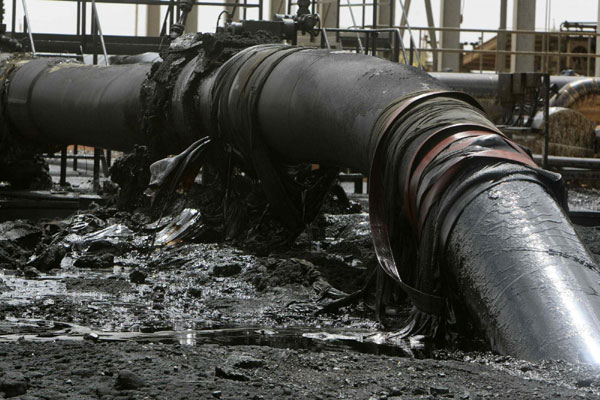KHARTOUM - Three days after the Sudanese army took it over, the Heglig area on the border between Sudan and South Sudan still appears like a battle field as all indicators there reflect the size of the battles which took place between the two countries' armies in the area.
Video footage shot by a press delegation accompanying the Sudanese president and obtained by Xinhua showed tens of bodies of South Sudan army soldiers scattering in the area.
The footage also showed damage inflicted on the Sudanese oil facilities in Heglig, where the electricity stations and crude oil accumulation units have been subjected to sabotage acts which Khartoum said were carried out by South Sudan army.
Although the Sudanese authorities managed to put out fires in the area, great damage has been caused to a major reservoir for crude oil in addition to eight electricity generators that used to supply the oil fields and the central factory with electricity.
|
 A view of a damaged oil pipeline in a largely damaged oilfield in Heglig April 23, 2012. [Photo/Agencies] |
Sudanese President Omar al-Bashir on Monday celebrated the " liberation" of Heglig with thousands of Sudanese fighters who fought for 10 days to restore the strategic area with Sudan's biggest oil fields.
Addressing the fighters, al-Bashir reiterated rejection to any negotiation with South Sudan, saying that "No negotiation with these people. Our talk with them will be with arms and ammunition because that is the only language which they understand."
"Sudan with its old borders will not accommodate us and the Sudan People's Liberation Movement (SPLM), and one of us should leave," he added.
He went on saying that "South Sudan government, on the top of which are (South Sudan President) Salva Kiir (Mayardit) and (chief negotiator) Pagan (Amum), does not care about its citizens because at the time when they send their sons and families to live and receive education abroad, they send the South Sudanese citizens to war with Sudan to target its economic capabilities," he added.
The Sudanese president further reiterated the continuation of mobilization against any attempt of aggression against Sudan, saying that "We will continue until every inch of our homeland in South Kordofan and Blue Nile areas is liberated from the remnants of the Sudan People's Liberation Army (SPLA)."
Maj.Gen. Kamal Abdul-Marouf, a Sudanese army commander who led the battles in Heglig, said the Sudanese army has killed 1,200 soldiers of South Sudan army during the battles in the area.
"We have destroyed and killed them and the last statistics affirm that 1,200 soldiers of the enemy were killed. We have also confiscated great amounts of military equipment, trucks, weapons and ammunition," he told reporters.
South Sudan army controlled Heglig on April 10, which increased the tension between Khartoum and Juba and sparked wide international condemnation, with the United Nations Security Council urging South Sudan to immediately withdraw from the area.
The Sudanese army announced the "liberation" of Heglig on Friday after bloody battles with South Sudan army.
Sudanese officials said that South Sudan's fighters have exercised deliberate sabotage and set fire on the oil infrastructure in Heglig.
South Sudan president said on March 26 that Heglig was part of his country despite the ruling by the International Court of Arbitration in 2009 that Heglig lies on the northern side of the border between Sudan and South Sudan.
Under international pressures, Juba announced its intention to withdraw its troops from the area on conditions that neutral international forces would be deployed and that Khartoum should commit itself not to use the area as a base to attack South Sudan. Khartoum immediately rejected the proposal.
Though the military confrontations between Sudan and South Sudan armies have ended, tensions between the two countries have not yet lessened as the two sides are trading accusations of continuing the escalation.
